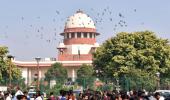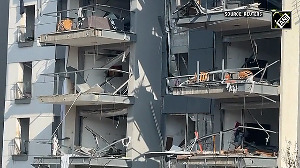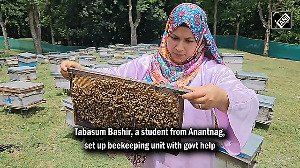'There is no doubt that he commands respect. He's on the ball.'
Aditi Phadnis reports.

Nuthalapati Venkata Ramana will have an 18-month tenure as Chief Justice of India. He takes charge on April 24. Expect no upheavals.
"He's an establishment man," says a senior advocate in the Supreme Court, adding hurriedly, lest he be misunderstood "but he does his own thinking -- and he puts the law first".
Justice Ramana is a first-generation lawyer in his family. He did not inherit his father's practice; nor, indeed, his library.
But in his area, he's not a nobody either: His family belongs to Andhra Pradesh's Krishna district, the area of influence of the Kamma caste, the powerful landed ruling elite of the Coromandel coast.
Legendary Andhra Pradesh Chief Minister N T Rama Rao; son-in-law and once close lieutenant, N Chandrababu Naidu; and the Delhi face of the Telugu Desam Party, P Upendra, are all Kammas.
So is former Supreme Court judge Jasti Chelameswar, current Supreme Court judge L Nageswara Rao -- and Justice Ramana.
Justice Ramana, 63, became a lawyer in 1983 and a judge in the Andhra Pradesh high court in 2000.
It didn't hurt that Naidu was chief minister. A Rajya Sabha seat was within reach.
But counsel that a judgeship would last longer, prevailed.
Justice Ramana himself said publicly that his father 'was afraid I would be arrested' when the Emergency was declared. That puts him in a certain square.
When his career advanced, as it inevitably happens in such cases, Justice Ramana found himself a casualty in a political battle.
In 2020, after alleging that land had been illegally allotted to Justice Ramana's family by the earlier regime, Naidu's bitter rival, Y S Jaganmohan Reddy, took the astonishing step of writing to the Chief Justice (and making the letter public) that via the alleged proximity between Justice Ramana and Naidu, attempts were being made to destabilise his government.
Of course, he did not mention that Justice Ramana was heading the bench hearing a PIL to fast-track criminal cases against former and current MPs and MLAs, including Jaganmohan Reddy, who was facing more than 30 cases of corruption and malfeasance in the scrutiny of the Central Bureau of Investigation and had been in prison.
The charges made by Reddy were dismissed by an in-house procedure.
"Let's put it this way: This is a man who's had more than a passing interest in politics; who knows how the political system works, but has essentially striven to be correct in law," says a Supreme Court lawyer.
Of all the Supreme Court lawyers to whom this reporter spoke, not one faulted Justice Ramana's legal acumen or integrity: not even the lawyers who represented Jaganmohan Reddy and were party to damaging assaults on Justice Ramana.
He never held it against them in court.
"Both, when he was due to be appointed to the Supreme Court and when he was about to be Chief Justice, there have been attempts to derail his elevation," says a senior advocate.
The best way of evaluating a judge is by the orders he has passed.
The most important is his judgment on the shutdown of the Internet in Kashmir.
"He left it to the administration. He was entirely right in the law. But in the enforcement of it, he still left it to the administration. You could say he sat on the fence. But he did not resort to a popular option, unlike other judges who created their own law to justify whatever the government was doing," says a lawyer.
"There is no doubt that he commands respect. He's on the ball. He has his judgment calls. Sometimes they go in your favour, sometimes they go against you," says senior Supreme Court lawyer Sanjay Hegde.
"He's a gentleman who gives respect and who commands respect, unlike some others."
One former Supreme Court judge said at a conference that Prime Minister Narendra Modi was 'a versatile genius, who thinks globally and acts locally".
He also invited the PM, the home minister and other members of the Union Cabinet to his grandson's mundan ceremony.
A former Chief Justice accepted a Rajya Sabha seat from the government after he retired.
When it comes to non-judicial conduct, Justice Ramana, therefore, faces a fairly low bar.
But there are challenges of other kinds.
In 2017, lawyer Saurabh Kirpal, who is gay, was approached by Justice Gita Mittal to become a Delhi high court judge.
He agreed. But so far, the three-member Supreme Court collegium, led by outgoing Chief Justice of India Sharad Arvind Boe, has not taken a decision on his elevation.
No one knows where the hitch lies. But sources say it is the law ministry which is sitting on the file -- apparently because Kirpal's partner is not an Indian national.
Many senior members of the bar are waiting to see what Justice Ramana will do on the matter.
More than anything else, the Kirpal case will decide if Justice Ramana will take the judiciary on a new trajectory of independence and assertion.












